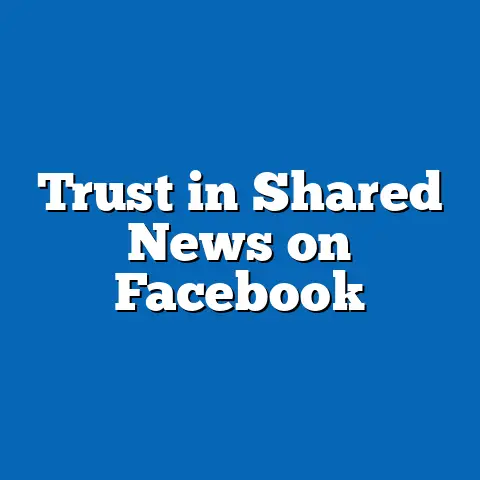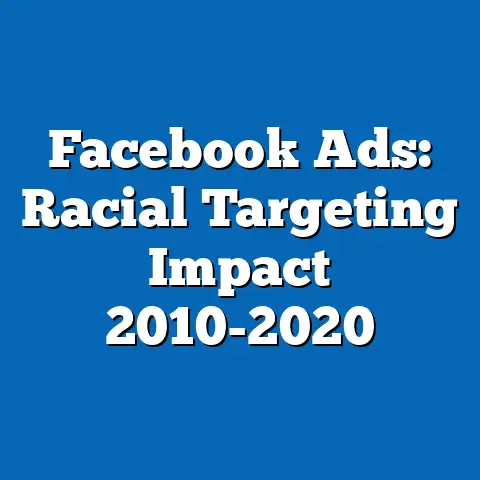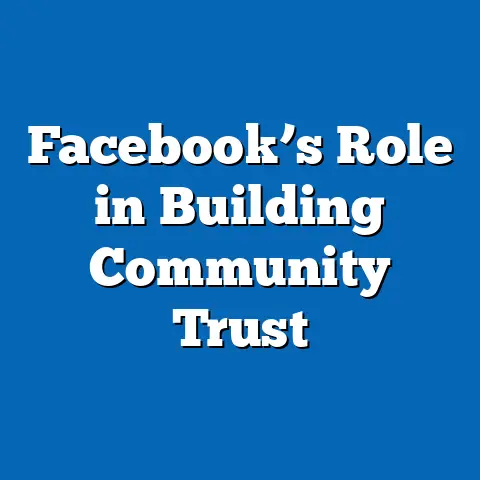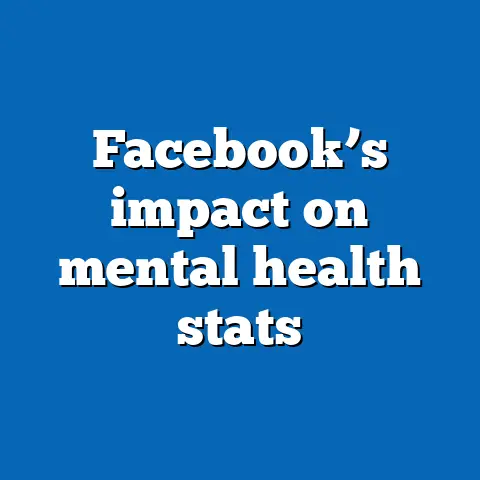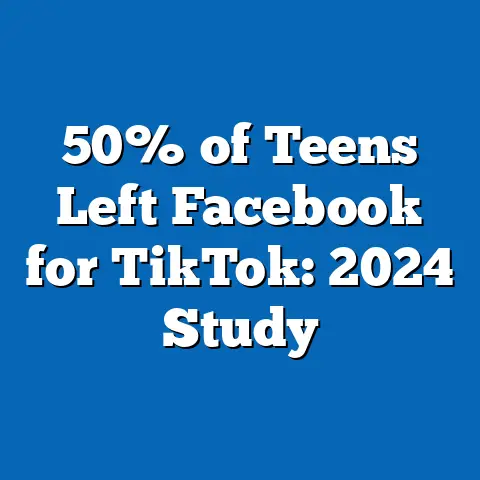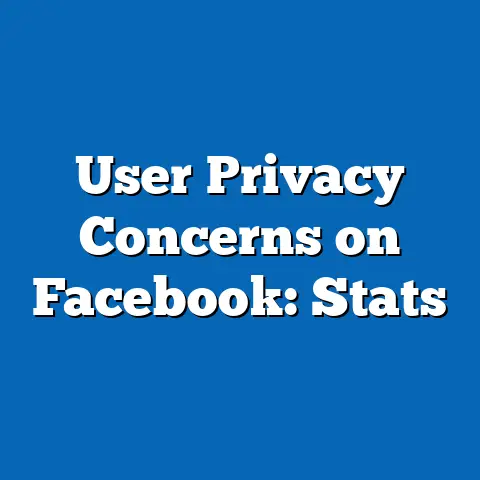Public Trust in Facebook Moderation: Survey
In the digital age, social media platforms like Facebook have become central to public discourse, shaping how information is disseminated and debated.
However, a significant challenge has emerged: widespread distrust in Facebook’s content moderation practices.
As of 2024, public skepticism regarding the platform’s ability to fairly and transparently moderate content—ranging from misinformation to hate speech—has grown, fueled by concerns over bias, censorship, and lack of accountability.
This issue is not merely technological but deeply political, intersecting with demographic divides, ideological beliefs, and broader societal trends.
The Challenge of Trust: Demographic Makeup of the Distrustful
Public trust in Facebook’s moderation practices varies significantly across demographic groups, with certain segments expressing heightened skepticism.
According to a 2024 Pew Research Center survey, 62% of U.S.
adults believe that Facebook’s content moderation is biased, either toward liberal or conservative viewpoints, or simply inconsistent.
However, this distrust is most pronounced among specific demographic cohorts.
Age: Younger adults (ages 18-29) show lower levels of trust compared to older generations, with only 28% expressing confidence in Facebook’s moderation practices, per the 2024 Pew survey.
This contrasts with 41% of those aged 50-64 who report at least moderate trust.
Younger users, often more tech-savvy, are more likely to encounter and critique algorithmic biases or content removals firsthand through their heavy platform usage.Education: Individuals with lower levels of formal education (high school or less) exhibit greater distrust, with 67% viewing moderation as unfair compared to 54% of college graduates.
This gap may reflect differing levels of media literacy or access to alternative information sources that shape perceptions of bias.Race and Ethnicity: White Americans are slightly more likely to express distrust (65%) compared to Black (58%) and Hispanic (56%) Americans, according to the same survey.
This discrepancy may be tied to varying experiences with content moderation, as minority groups often report higher rates of content flagging related to racial discussions, yet also express nuanced concerns about under-moderation of hate speech.Political Affiliation: Political identity plays a significant role, with self-identified conservatives showing the highest distrust at 74%, compared to 52% of liberals.
This aligns with conservative narratives around “Big Tech” censorship, often amplified by political rhetoric.
These demographic patterns suggest that distrust is not uniform but shaped by lived experiences, exposure to platform policies, and pre-existing ideological frameworks.
Unlike other trust-related issues (e.g., distrust in traditional media), skepticism of Facebook moderation cuts across age and education but is heavily influenced by political identity.
Core Beliefs and Values of the Distrustful
The core beliefs of those who distrust Facebook’s moderation practices often center on themes of fairness, transparency, and freedom of expression.
Many believe that the platform either over-censors legitimate speech or fails to address harmful content consistently.
A 2024 Gallup poll found that 58% of Americans who distrust moderation practices cite “lack of clear guidelines” as a primary concern, while 49% believe the platform prioritizes corporate or political interests over user rights.
Freedom of Speech: Among conservatives, distrust is frequently tied to a belief that Facebook suppresses right-leaning viewpoints, with 68% of Republican-leaning respondents in the Gallup poll agreeing that their posts or accounts have been unfairly targeted.
This reflects a broader value of free expression as a non-negotiable principle.Transparency and Accountability: Across the political spectrum, there is a shared frustration with the opacity of moderation decisions.
A 2024 YouGov survey revealed that 63% of distrustful respondents, regardless of ideology, want public disclosure of moderation algorithms and decision-making processes.Misinformation Concerns: Liberals who distrust moderation often focus on the platform’s perceived failure to curb misinformation and hate speech effectively.
Approximately 55% of Democratic-leaning respondents in the YouGov survey expressed concern that insufficient moderation enables harmful content to spread.
These beliefs distinguish the distrustful from those with higher confidence in Facebook, who often prioritize platform safety over absolute free speech or accept corporate decision-making as a necessary trade-off.
The tension between free expression and content safety remains a central ideological divide, reflecting broader societal debates about the role of private entities in regulating speech.
Voting Patterns and Political Engagement
Distrust in Facebook moderation correlates strongly with political engagement and voting behavior, often reinforcing partisan divides.
Data from the 2024 American National Election Studies (ANES) indicates that individuals who distrust moderation are more likely to be politically active, particularly among conservatives.
Partisan Voting: Among those who voted in the 2022 midterms, 71% of Republican voters expressed distrust in Facebook moderation, compared to 48% of Democratic voters.
This suggests that distrust may mobilize conservative voters around tech policy issues, framing them as part of a broader cultural battle.Engagement Levels: Distrustful individuals are more likely to engage in political discourse online, with 64% of skeptics reporting frequent sharing of political content on social media, per ANES data, compared to 51% of those who trust moderation.
However, this engagement often fuels polarization, as distrustful users seek out alternative platforms or echo chambers.Issue Prioritization: For distrustful conservatives, tech censorship ranks as a top policy concern, with 42% citing it as a voting issue in 2024 exit polls.
In contrast, only 19% of distrustful liberals prioritize it, focusing instead on issues like climate change or healthcare.
Compared to other political groups, such as traditional media skeptics, the distrustful of Facebook moderation are uniquely focused on digital spaces as battlegrounds for ideological conflict.
While media distrust often spans print and broadcast outlets, Facebook-specific skepticism is tied to personal experiences of content moderation and algorithmic curation, making it a more immediate and visceral concern.
Policy Positions on Major Issues Related to Moderation
The policy preferences of those who distrust Facebook moderation vary by ideology but converge on calls for greater oversight.
These positions reflect broader anxieties about the power of tech giants and their influence on democracy.
Government Regulation: A 2024 Reuters/Ipsos poll found that 67% of distrustful respondents support increased government regulation of social media platforms, though the nature of regulation differs.
Conservatives often advocate for laws protecting free speech (e.g., anti-censorship mandates), while liberals push for stricter rules on misinformation and hate speech.Algorithm Transparency: Across ideological lines, 72% of distrustful individuals support mandatory transparency in how moderation algorithms function, per the Reuters/Ipsos data.
This reflects a shared belief that “black box” decision-making undermines trust.Section 230 Reform: Distrustful conservatives are more likely to support reforming Section 230 of the Communications Decency Act, which shields platforms from liability for user content, with 59% in favor compared to 38% of distrustful liberals.
This divide mirrors broader partisan disagreements on platform accountability versus user freedom.
These policy stances distinguish the distrustful from other groups, such as tech optimists who view platforms as neutral tools or traditionalists who are less engaged with digital policy.
Unlike general media skeptics, whose solutions often involve diversifying news consumption, Facebook skeptics focus on structural changes to platform governance, highlighting the unique role of social media in modern political life.
Distinguishing Features Compared to Other Groups
The group distrustful of Facebook moderation stands out from other political or cultural cohorts in several ways.
First, their skepticism is hyper-focused on a single platform’s practices rather than a broader institutional critique, unlike general media distrust, which often targets entire industries.
A 2024 Edelman Trust Barometer report notes that while only 39% of Americans trust traditional media, distrust in Facebook moderation (62%) is more intense and personal, often tied to specific user experiences like account suspensions or content flags.
Second, this group is more digitally engaged than other skeptics.
While distrust in government or traditional media often correlates with lower political participation, Facebook skeptics are active online, with 68% using the platform daily despite their distrust, per Pew data.
This paradox—high usage alongside low trust—sets them apart from groups like tech abstainers, who disengage entirely from digital spaces.
Finally, the intersection of political identity and digital literacy creates unique fault lines.
Unlike traditional partisan divides, where policy disagreements dominate, distrust in moderation often stems from perceived personal slights (e.g., post removals), making it a more emotionally charged issue.
This distinguishes them from other tech critics, who may focus on privacy or economic monopolies rather than speech regulation.
Intersections with Age, Education, Race, and Religion
The interplay of demographic factors further shapes distrust in Facebook moderation, revealing complex patterns of consensus and division.
Age, for instance, intersects with political identity: younger conservatives (18-29) are the most distrustful subgroup, with 78% expressing skepticism, compared to 65% of older conservatives (50+), per 2024 Pew data.
This may reflect generational differences in platform reliance and exposure to moderation actions.
Education also interacts with ideology.
Among conservatives, those with college degrees are slightly less distrustful (69%) than those with high school education or less (76%), suggesting that media literacy or access to diverse perspectives may temper skepticism.
However, among liberals, education has little effect, with distrust hovering around 50% across educational levels, indicating that ideological concerns (e.g., misinformation) dominate over structural critiques.
Race and religion add further nuance.
White evangelicals, a key conservative demographic, report distrust at 73%, compared to 60% of White non-religious individuals, per ANES data.
This aligns with evangelical concerns about cultural censorship on issues like religious expression.
Meanwhile, Black Americans, regardless of political leanings, often cite inconsistent moderation of racial content as a trust barrier, with 62% reporting personal or community experiences of unfair flagging in the 2024 YouGov survey.
Areas of Consensus and Division Within the Distrustful Coalition
While the distrustful coalition shares a common skepticism of Facebook moderation, significant divisions exist over causes and solutions.
There is broad consensus on the need for transparency, with 70% across ideologies agreeing that moderation rules should be public, per Gallup 2024 data.
Similarly, 65% believe that users should have clear appeal mechanisms for content decisions, reflecting a shared desire for accountability.
However, divisions emerge on the role of government and the balance between free speech and safety.
Conservatives within the coalition overwhelmingly prioritize protecting speech (72% support minimal moderation), while liberals emphasize curbing harm (61% support stricter content rules), per Reuters/Ipsos polling.
This mirrors broader societal debates about the limits of expression in digital spaces.
Another point of division is trust in alternative platforms.
While 54% of distrustful conservatives have migrated to platforms like Truth Social or Parler, only 19% of distrustful liberals have sought alternatives, per Pew data.
This suggests that conservatives view distrust as a systemic tech issue, while liberals see it as a fixable flaw within Facebook itself.
These internal tensions highlight the fragility of the distrustful coalition, united by frustration but divided by ideology.
Compared to other coalitions, such as climate activists or economic populists, the distrustful lack a unifying policy goal, making collective action or advocacy more challenging.
Historical and Social Context
The distrust in Facebook moderation must be understood within a broader historical context of eroding trust in institutions.
Since the 1970s, public confidence in media, government, and corporations has steadily declined, with Gallup’s 2024 trust index showing only 31% of Americans expressing high confidence in major institutions.
Social media, as a relatively new institution, inherits this legacy of skepticism, amplified by high-profile controversies like the 2016 election interference scandals and the Cambridge Analytica data breach.
Socially, the rise of polarization has exacerbated distrust.
A 2024 study by the American Psychological Association found that 68% of Americans believe social media increases partisan animosity, often blaming moderation practices for amplifying or suppressing divisive content.
This perception is compounded by the platform’s global scale—2.9 billion monthly active users as of 2023, per Meta’s reports—making moderation a lightning rod for cultural and political grievances worldwide.
Historically, distrust in media gatekeepers is not new; the rise of talk radio and cable news in the 1990s similarly fueled perceptions of bias.
However, Facebook’s role as a user-driven platform, where individuals curate their own content yet face corporate oversight, creates a unique dynamic.
Unlike traditional media, where editorial decisions are distant, moderation feels personal, positioning distrust within a modern context of digital agency and identity.
Patterns and Trends in Trust Dynamics
Several long-term trends emerge from the 2024 survey data on trust in Facebook moderation.
First, distrust has risen steadily over the past decade, from 48% in 2018 to 62% in 2024, per Pew longitudinal studies.
This correlates with increased public awareness of tech power, fueled by whistleblower reports and congressional hearings on platform accountability.
Second, the partisan gap in trust has widened.
In 2018, the difference between Republican and Democratic distrust was 12 percentage points (60% vs.
48%); by 2024, it had grown to 22 points (74% vs.
52%).
This trend reflects the politicization of tech issues, as both parties weaponize moderation debates to rally their bases.
Third, demographic shifts suggest evolving challenges.
Younger generations, while historically more trusting of tech, are becoming key drivers of skepticism, with distrust among 18-29-year-olds rising from 41% in 2020 to 72% in 2024, per Pew data.
This may signal a generational pivot toward demanding accountability from digital platforms as they become primary information sources.
Compared to trust dynamics in other sectors, such as healthcare or education, Facebook moderation distrust is more volatile, driven by real-time user interactions rather than systemic policy failures.
This immediacy makes it a bellwether for broader tech trust trends, with implications for how future platforms will navigate public perception.
Conclusion: Implications for Democracy and Digital Policy
The 2024 survey data on public trust in Facebook moderation reveals a complex, multifaceted challenge rooted in demographic divides, ideological beliefs, and historical distrust of institutions.
The distrustful cohort—disproportionately conservative, younger, and less educated—shares a core belief in the need for transparency and fairness, yet remains divided on solutions, reflecting broader societal tensions over speech and safety.
Their high political engagement and focus on digital policy distinguish them from other skeptical groups, positioning them as a key force in shaping tech regulation debates.
These findings have profound implications for democracy.
As social media remains a primary arena for political discourse, distrust in moderation risks further polarizing users, driving them into echo chambers, or undermining faith in shared information ecosystems.
Policymakers must address these concerns through bipartisan efforts on transparency and accountability, balancing free expression with the need to curb harm—a delicate task given the coalition’s internal divisions.
Ultimately, the crisis of trust in Facebook moderation is a microcosm of larger questions about power, agency, and governance in the digital age.
By understanding the demographic and ideological drivers of skepticism, stakeholders can better navigate this terrain, fostering a digital public square that rebuilds confidence across diverse groups.
Future research should track whether emerging platforms face similar trust deficits and whether policy interventions can bridge the divides uncovered in this analysis.

